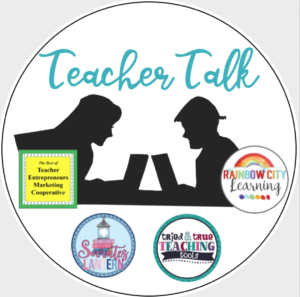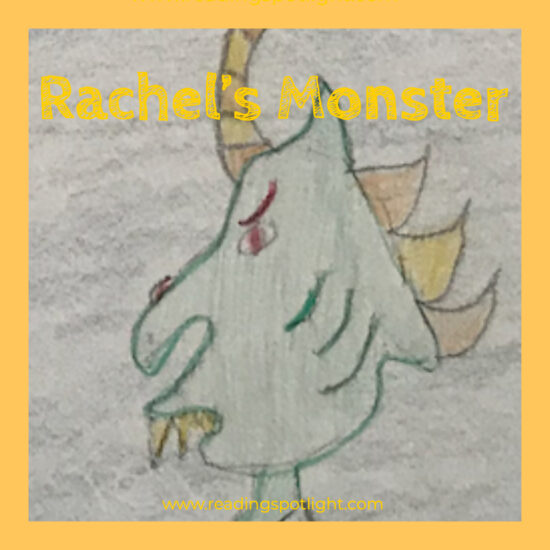Rachel and I wrote an unpublished book together
—this is her monster story.
The first time I saw Rachel she was standing in the hall near her first-grade classroom door. Her eyes met mine, but she then turned her face to the wall. I did not know at that time she would become one of my first primary grade remedial reading students, nor did I know that she was repeating first grade. (With her twin sister, I might add, who did not need to repeat the grade—but that’s another story.)
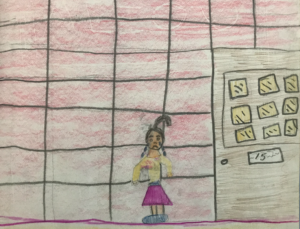
Rachel was often standing outside her classroom because it was the preferred form of punishment of her teacher when Rachel acted out. This form of “discipline” did have the added benefit of some quiet relief for the class as well as the teacher. Rachel’s other teachers said that her second time around seemed to be worse than her first.
Now a primary remedial reading teacher, after stints as a high school English teacher and middle school remedial reading teacher, I was a bit worried about teaching this level. Faced with 20-minute, twice-a-week time constraints for instruction, I had concluded that young minds with mostly blank reading slates would be more efficient than breaking the bad reading habits and prejudices of older readers and then reteaching in the short time span for “pull-out“ classes allowed by the middle school system.
Once faced with this level though, I realized that I had received almost no training for teaching elementary students, neither pedagogic nor psychological. And FIRST grade—wow! (By the way, I admit that I never realized before this experience how hard elementary teachers work.)
Because most of my primary remedial readers had failed at phonics and/or whole language, I knew that I had to find a different format for teaching decoding, so I developed my own linguistic and morphologic approach for primary students.
Using consistent word family patterns, this method was quite successful for the remaining 18 years that I spent as an elementary reading specialist.
I relied on what was in my heart regarding TONE. You can read about how learning to golf taught me about tone in this previous blog post:
Before I began actual teaching, I had the luxury of testing and interviewing each of my 70 students. With Rachel, I was able to glean that she loved animals and actually knew quite a bit about their habits. This was my opening. I spent time and $ finding easy readers for Rachel about different animals at her instructional level.
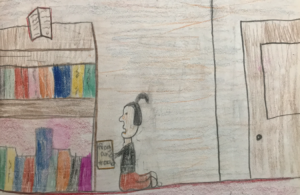
Besides worksheets with mostly word families, each of my students chose his or her own books to read, always at an independent or instructional level so that frustration would not set in.
We read a lot of easy poetry, too, because poetry ingrains fluency.
I had to be firm with Rachel. Frequent smart mouth comments were side-eyed by me. They diminished gradually as she began to realize that I was determined to teach her to read, because she was actually improving, and also because I gave her a decent amount of respect that she did not encounter in her other classes. In my experience ALL children want to learn to read. It has been my ultimate fulfillment to aid in that regard.
Rachel and I wrote her story together about reading failure and success, but I was somewhat surprised when I saw the pictures that she drew for the book. Lightly colored but emotional, they portrayed a sad, angry girl, and the monster picture will remain with me forever.
After three years as my remedial reading student, Rachel became a star—reading above grade level. She said that she still had a smart mouth, but now she had a smart brain to go with it. She ended the book with that comment—finally, a fairly contented and confident student.
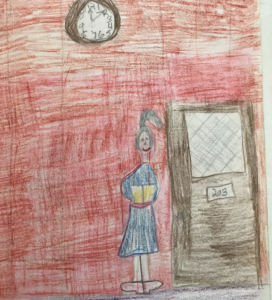
I often read Rachel’s book to incoming students, and as a teen, she returned to read her book to some of my first-grade remedial students. I hope that teachers who encounter students who repeat a class or a grade level consider the lingering effects and how these kids might contemplate school subsequently.
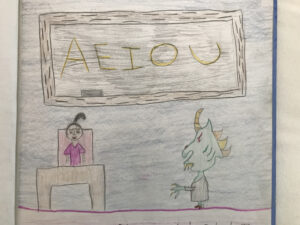
Happy Halloween!
Reading Spotlight 2021
Here are some interesting posts about education from my friends at TBOTEMC:
